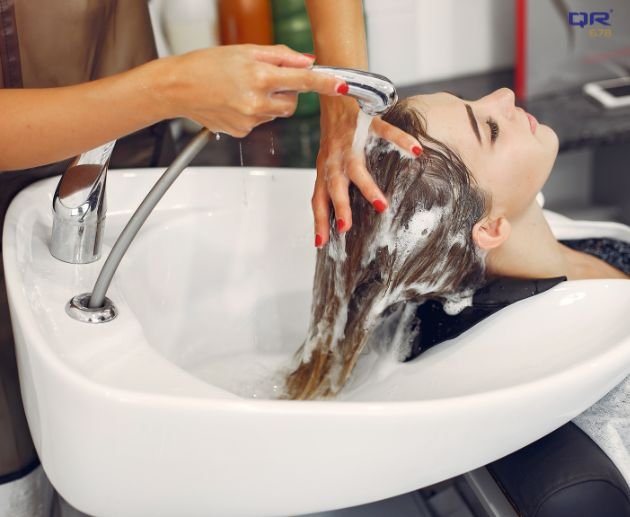How to Take Care of Hair During Menopause

Hair can change during menopause. Some women notice more hair fall than before. Others feel their hair has become dry or thinner. The texture might also shift. Hair that used to be smooth might feel rough or look uneven.
These changes are normal. They happen as hormone levels drop, especially oestrogen. This affects how the hair grows, how thick it feels, and how healthy it looks. You cannot control the hormones, but you can take care of your hair in simple ways that make a real difference.
This blog - How to Take Care of Hair During Menopause walks you through those steps. Nothing fancy, just calm, clear habits that support your hair every day.
Also Read: how to take care of thin frizzy hair
Do Not Overwash Your Hair
Hair needs moisture to stay soft. But during menopause, the scalp may produce less oil. If you wash your hair too often, it can feel even drier.
Try washing your hair two to three times a week. Use lukewarm water. Hot water strips away the little moisture that remains.
Focus on cleaning your scalp. Let the shampoo run down the length without rubbing or twisting your hair.
Use a Soft Shampoo
Your hair might react differently now to the products you used in the past. Strong shampoos can make it feel rough.
Pick a shampoo that is made for dry or ageing hair. Look for labels that say sulphate-free or gentle cleanse. These shampoos keep your scalp clean without causing irritation.
If you colour your hair, choose a shampoo that protects colour. This avoids extra dryness from chemicals.
Always Follow with Conditioner
Dry hair needs help to stay smooth. A conditioner does this job. It softens the hair, helps you detangle it easily, and keeps the ends from drying out.
Apply conditioner from the middle of your hair down to the tips. Leave it on for two or three minutes, then rinse with cool or normal water. This helps seal the surface of your hair so it stays less frizzy.
Also Read: how to take care of hair after rebonding
Deep Condition Once a Week
Even with regular conditioning, your hair may need a little more care. A once-a-week treatment can help.
You can use a hair mask or natural oils like coconut or almond oil. Apply a small amount to damp hair. Let it sit for half an hour, then rinse and wash gently. This step helps the hair hold on to moisture and reduces roughness.
Avoid Heat Whenever You Can
Hair that feels weak or dry does not handle heat well. Blow drying, straightening, or curling can make breakage worse.
Let your hair dry naturally when possible. If you must use a dryer, keep it on the cool setting and apply a heat protection spray first. Heat should be the last option, not part of your daily routine.
Do Not Tie Your Hair Too Tight
Hair fall can become worse if the roots are pulled too hard. Avoid tight ponytails, heavy clips, or rubber bands.
Keep styles loose. Use soft hair ties. Let your hair rest if it feels sore near the scalp. This small change can help reduce pressure on the roots.
Comb Gently and Start from the Ends
Use a wide-tooth comb. Start from the tips and slowly move upward. This prevents tugging and protects your hair from damage.
Do not comb wet hair too hard. If your hair is tangled, apply a little leave-in conditioner or mist to help loosen the knots. Patience is important when combing thinning or dry hair.
Also Read: how to take care of hair after pregnancy
Trim Often to Avoid Split Ends
Split ends make hair look rough. They also lead to more breakage. Trimming your hair every six to eight weeks keeps it tidy.
You do not need to cut a lot. Just enough to clean the edges. This helps your hair grow out in a healthier shape.
Cover Your Hair in Strong Sun or Wind
Sunlight and dry wind can take away moisture from your hair. If you are going out for a long time, cover your hair with a scarf or soft hat.
You can also apply a light serum or oil before stepping out. This adds a thin shield and helps your hair stay soft.
Eat Foods That Help Hair Stay Strong
What you eat matters. Hair needs protein, iron, and healthy fats to grow well.
Include leafy vegetables, eggs, nuts, seeds, lentils, and whole grains in your meals. Drink water regularly throughout the day. Healthy hair starts with a well-fed body.
Try to Sleep Well and Reduce Stress
Hair fall can increase when your body is under stress. Menopause can affect sleep, mood, and energy. These changes also show up in your hair.
Try to sleep at the same time each night. A short walk or reading before bed can help calm your mind. When your body rests, your hair benefits.
Hair care during menopause does not have to be hard. You do not need special treatments or heavy routines.
Use kind products. Be gentle when touching or brushing your hair. Eat well. Rest when your body tells you to. Over time, these small actions can help your hair feel more balanced, soft, and easier to manage.